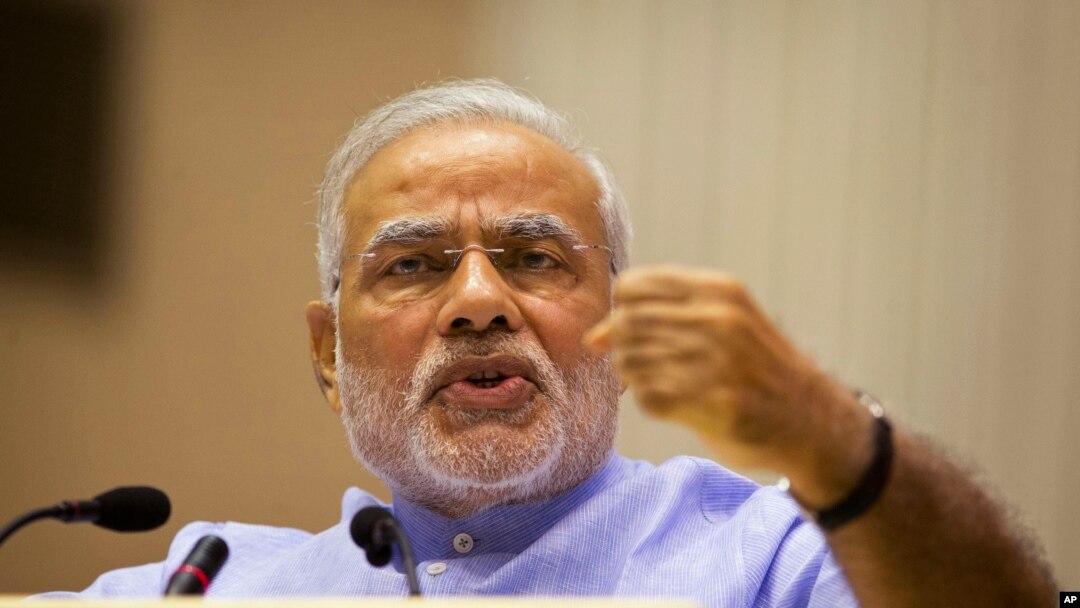India's prime minister is heading to Japan Saturday for a five-day visit to shore up defense and economic ties. The blossoming relationship between the two Asian countries is partly driven by their mutual need to counterbalance China, with which both have territorial disputes.
Prime Minister Narendra Modi has a broad agenda. He is seeking more Japanese investment in manufacturing and infrastructure. He is also eyeing a breakthrough civil nuclear cooperation pact, which could open the door to India importing nuclear fuel and technology from Japan.
China concern
The two countries will discuss an agreement to bolster defense coordination and the possible sale of Japanese amphibious search and rescue planes to the Indian navy. Besides the Japanese prime minister, the Indian leader will meet the Japanese defense minister.
Strategic expert Bharat Karnad at New Delhi’s Center for Policy Research says worries about an assertive China are driving them into a closer security partnership.
“You have Japan at one end and India at the other in terms of bookending China. It is one way of fencing in China even as both countries continue with their trade and economic relations that they have with Beijing. So that is not at stake. What is that you are building up by way of a hedging strategy this aspect of military cooperation that might give Beijing a second thought should it get too aggressive or too expansive in its policies and ambitions,” said Karnad.
India has a long festering border dispute with China and is concerned about being encircled by a string of ports Beijing is building in neighboring countries. Tensions between Japan and China have escalated over disputed islands in the East China Sea.
But trade is as much the driving force that has prompted the Indian prime minister to make Japan his first overseas stop outside of South Asia.
Trade and investment
Modi is accompanied by a large business delegation. He is looking for Japanese support in building high-speed railways and smart cities that are part of his agenda to take India further into the 21st century.
Manoj Joshi at the Observer Research Foundation in New Delhi says a sense of mutual advantage is bringing Asia’s second- and third-largest economies together.
“Japan is a country with a great deal of high technology, it has got investable resources, it is already playing a huge role in our infrastructure construction," said Joshi. "Since we have a requirement for many, many more times that, so we look at Japan as a good partner from our point of view. Japan is also looking at us because it has been having problems in China, so many Japanese companies are looking to India as kind of hedging their bets with regard to China. So the Japanese see us a huge market.”
In a signal that Japan wants to reduce its dependence on China, the Nikkei daily in Tokyo has reported that the two countries are expected to sign a deal to jointly produce rare earth metals in India, which Tokyo sources from Beijing.
FILE - Japan's Prime Minister Shinzo Abe, June 5, 2014.
Modi is no stranger to Japan - he visited the country twice when he was chief minister of Gujarat state and met Prime Minister Shinzo Abe on both visits.
Bharat Karnad says the well-known rapport between Abe and Modi is expected to boost the relationship.
“It is the glue that is going to cement relations. They get along well, they basically see the world in similar terms. Both are nationalists, both are right of center, their values are in sync, their economic thinking is in sync,” said Karnad.
Modi is one of three people Prime Minister Abe follows on Twitter. In some Twitter diplomacy before his visit, the Indian leader has Tweeted in Japanese and English, saying “Japan’s friendship with India is time-tested, we are two vibrant democracies committed to advancing peace and democracy in the world.”


